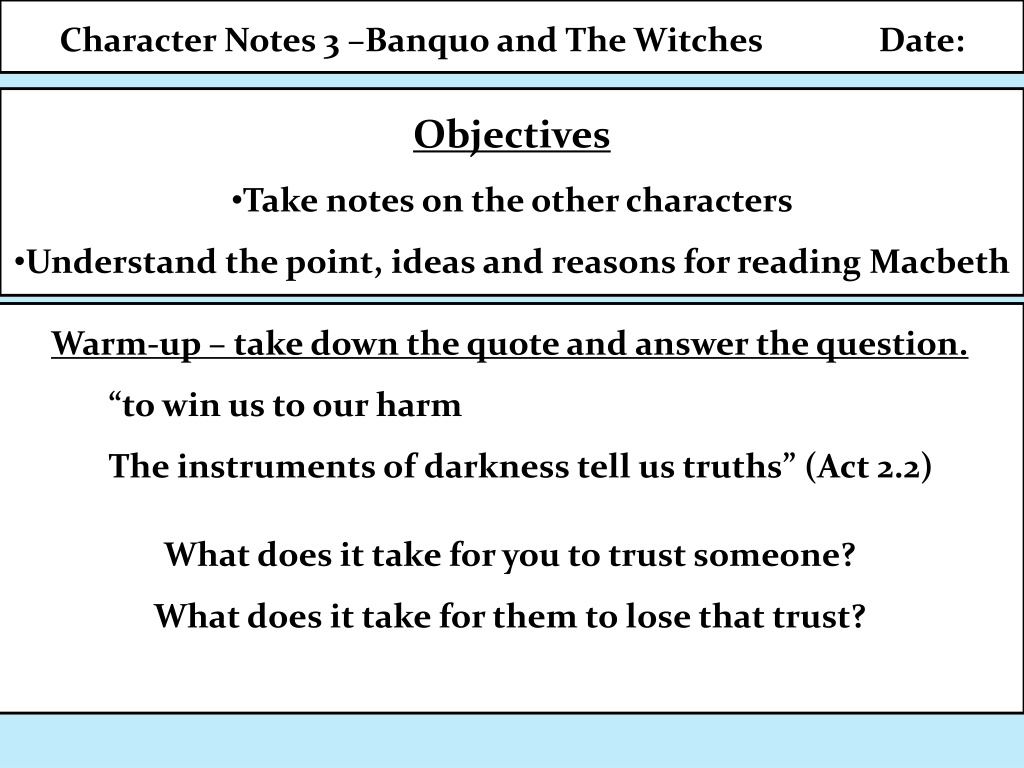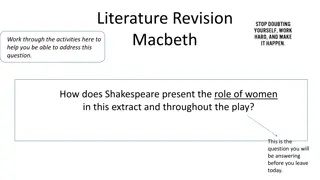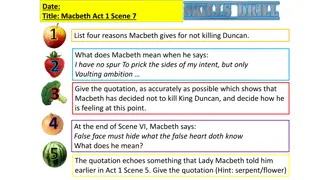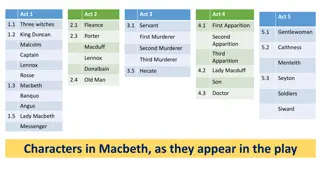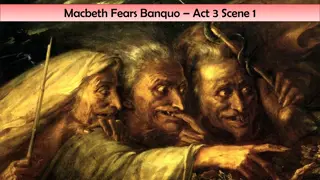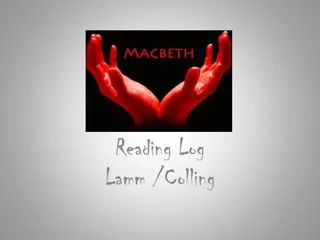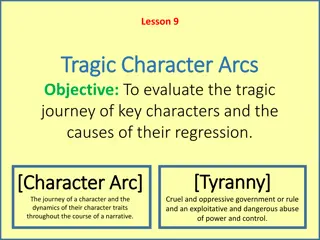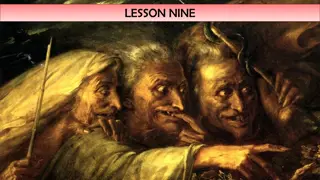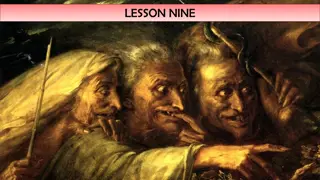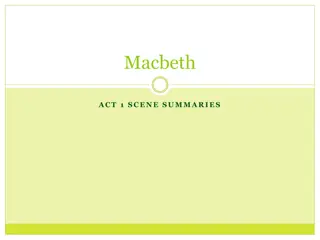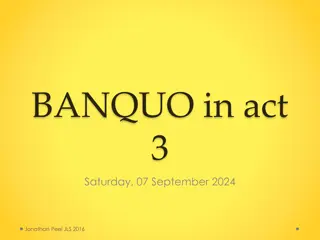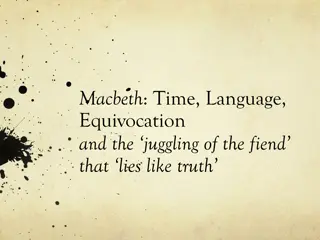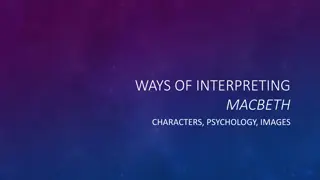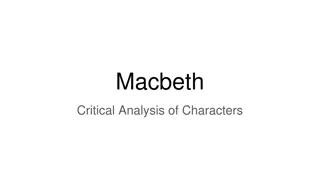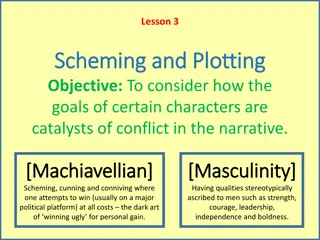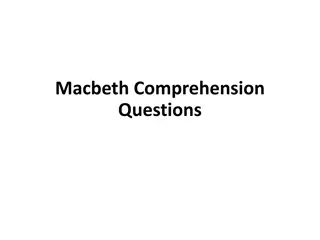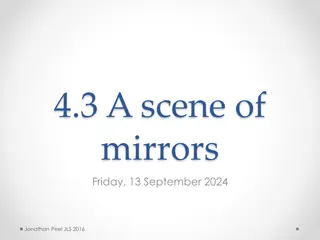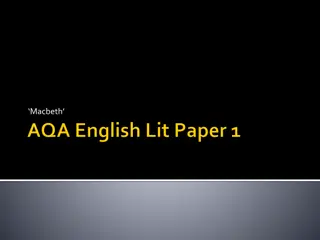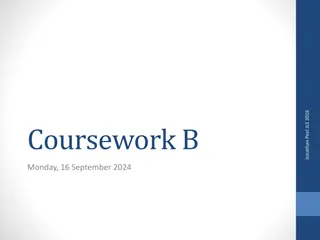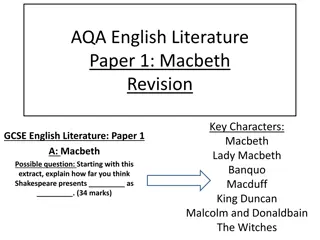Character Analysis: Banquo in Macbeth
Banquo in "Macbeth" is portrayed as a noble and wise character who contrasts with Macbeth in how he responds to the prophecies of the witches. Initially seen as a good guy loyal to King Duncan, Banquo's actions become more ambiguous as the story unfolds. His hesitations, suspicions, and eventual silence regarding Macbeth's actions raise questions about his moral standing. Despite his initial reluctance, Banquo's eventual complicity in Macbeth's crimes leads to his tragic end, emphasizing the theme of corruption in the play.
Download Presentation

Please find below an Image/Link to download the presentation.
The content on the website is provided AS IS for your information and personal use only. It may not be sold, licensed, or shared on other websites without obtaining consent from the author.If you encounter any issues during the download, it is possible that the publisher has removed the file from their server.
You are allowed to download the files provided on this website for personal or commercial use, subject to the condition that they are used lawfully. All files are the property of their respective owners.
The content on the website is provided AS IS for your information and personal use only. It may not be sold, licensed, or shared on other websites without obtaining consent from the author.
E N D
Presentation Transcript
Character Notes 3 Banquo and The Witches Date: Objectives Take notes on the other characters Understand the point, ideas and reasons for reading Macbeth Warm-up take down the quote and answer the question. to win us to our harm The instruments of darkness tell us truths (Act 2.2) What does it take for you to trust someone? What does it take for them to lose that trust?
Plan for today examine some points on the other characters . 6. Their 1. Banquo similarities to Macbeth. importance Banquo and The Witches 2. Differences to Macbeth. 5. Their plan 4. The Witches what are they? 3. A good guy?
Banquo There is an old saying which states that for evil to triumph all it takes is for good men to do nothing . Banquo is one of those good men. He is introduced as a brave and wise man who is equal to Macbeth in battle as he is praised by the king: Noble Banquo, Thou hast no less deserved Nor must be known no less to have done so ( Act 1.4) Banquo s role in the play is to be compared and contrasted to Macbeth. They both fight the same battle, meet the witches and must deal with the prophecies. How Banquo reacts is what separates him from Macbeth. (If you see something and say nothing how responsible are you?)
Differences to Macbeth Banquo s appearance as a wise and noble man is reinforced when he and Macbeth hear the prophecies. As if predicting the future, he tries to warn Macbeth not to listen to the witches for it Might yet enkindle you unto the crown (Act 1.3) He is correct that hearing the prophecy sparks an unhealthy interest into becoming king and will manipulate good men into doing bad things. His advise to shield themselves from evil influence is wise yet too late. While his thoughts do like turn straight to murder and desire, he feels the effect of the prophecies. Also unlike Macbeth, he prays to God and the angels to help him. (If all it takes is a suggestion to do bad for people to do bad things, are people weak?)
A good guy? Many people consider Banquo to be a clear goodguy because he makes his allegiance to Duncan clear. When Macbeth subtly asks him for support in his desire to be king, Banquo refuses. After Duncan is killed however, Banquo s actions show him to be a compromised figure, as he says about the witches: May they not be my oracles as well And yet set me up in hope? (Act 3.1) Banquo remains silent about Macbeth, though he suspects him of killing Duncan. He does this because if the witches prophecies came true for Macbeth, there is hope that his children will be king. As such he is complicit in Macbeth s crime. Rather than being a shining light then, Banquo is another example of corruption and he too dies for this. (Could Banquo have been punished for not telling anyone about his suspicions?)
The Witches The three witches are considered to be the embodiment of evil in the play. They are described as instruments of darkness by Banquo who also refers to them as the devil. Like in devil in Christianity, this dark force tempts people to do evil; encouraging a dark desire that already lies within them. All they need to say to Macbeth is a simple greeting. All hail Macebth, hail to thee Thane of Cawdor All hail Macbeth, that shalt be King hereafter (Act 1.3) As well as the ability to effectively predict the future, they are also shown to have the ability to vanish, summon spirits, manipulate the weather and perhaps even fly. They appear as supernatural beings; not part of this world but from somewhere darker and more demonic. (Old saying Corruption of the best of us is the worst do you agree?)
Their plan The witches appear to have no motivation for their deeds apart from they enjoy doing evil. They do not gain money or power nor do they have a grudge against Macbeth or Scotland but they set out to destroy everything possible. The result of their actions are, as Macduff describes: each new morn New widows howl, new orphans cry, new sorrows Strike heaven on the face (Act 4.3) To create this hell on earth, all they had to do was tempt a single man to follow his ambition. They did not tell Macbeth to kill Duncan, Banquo, Macduff s family or anyone else. They merely sowed the seeds of destruction. (Is there a way to blame everyone if you really try?)
Their importance It is important to note that the witches never lie. All their predictions come true however the language they use leads Macbeth to make assumptions and be misled. This is called equivocation . Macbeth hears what he wants; the favourable outcome he desires only to later realise the truth. It is only before his death he says: I pull in resolution and begin To doubt the equivocation of the fiend That lies like truth (Act 5.5) The prophecies are given to encourage Macbeth to continue his reign of terror. The double meanings in them make Macbeth appear invincible when in fact a wood can move and a man born not of a woman can fight. (Once you ve read through all this notes, summarise them in your own words. Six paragraphs, 2 pages, use the quotes.)
